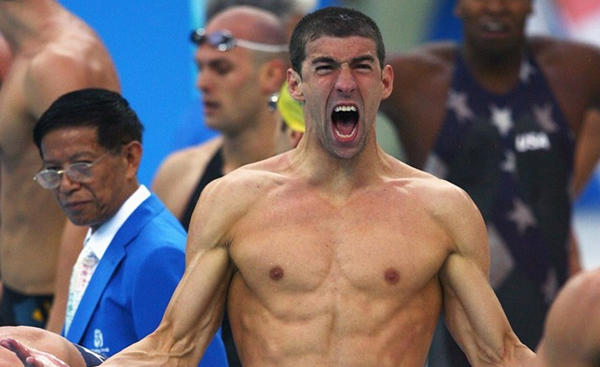8.23.2008 | Michael Phelps and his racting grid

Source: NBCOlympics.com, photo credited to Shaun Botterill of Getty Images
I have been watching the Olympics, the NBC-branded, USA-centric, copyright-controlled version in the nighttime indolence of post-labor exhaustion. I've been watching all those young people in the spotlight, sequestered in training centers for years and supported by second mortgages and other fiscal feats, now princes and princesses for two weeks. Cameras record their every move from every angle, and the cameras and camera operators follow in swarms as surreal as the clouds of toner from The Diamond Age.
To me, the combination of isolation, youth, and the constant knowledge—indeed observance—of being seen is a dangerous mix. I don't think I can even imagine how twisted self-consciousness and self-concept can become from that experience. I saw a gymnast, a young woman, approach the barrier to yell hello to her family in the stands. In the moment that she approached the barrier, her line of sight filled with camera lenses, some mere inches from her face. What would you experience if that were you? Do you think you would be annoyed? Probably. Do you think you could avoid feeling that you were extra special? How could you fail to see yourself the way the TV told you you were?
I can relate insofar as I know what it feels like to be the focus of attention in front of a group and to imagine that every person sees every movement, every perfection and imperfection, and is at least observing if not judging. I know from this minute approximation that I respond by becoming aware of everything that I imagine everyone sees, and I notice that I try to control it—contol the image and the action they see. I perform. This is probably a pretty normal reaction, so I imagine that even Olympic athletes intently focused on competition also notice the aspect of stage and behave similarly. True, sport is a performance and they are already performing. But the spectacle of the sport, the drama created and then re-enacted to the point of emotional pornography by the media, is a separate event, unpredictable and always adapting, that cannot be anticipated ahead of time. Youth is a profound factor. No matter how mature, intelligent, and disciplined they are, young athletes by the very circumstance of being young lack the broader perspective that age brings. I can't imagine that any athlete, no matter how grounded psychologically, can find it easy to cope well and objectively with the intense media gaze. This is especially true for those who are quickly elevated to all-around celebrity and subject to ubiquitous media treatment.
I started thinking about this when Phelps et al won the first relay and Phelps erupted into that roaring posture that the newscasters called excitement but that to me looked a bit forced. The cameras devoured it, holding their gaze on him for as long as he held the pose. We were in a deadlock and I wondered who would break first. The longer it held the more fake it looked, and then I realized what it must be like to experience the joy and to simultaneously observe yourself as other observers observe you. The more you observe yourself being observed, the better you become at putting on a show. How fucked up. After that realization, I'm pretty sure there's nothing candid about anything Phelps does. He must always be performing for the camera, playing the mental reel a split second ahead of actual frame capture to choreograph every small move and gesture, from the hike of his swimsuit to his demeanor on the podium—especially the podium, where cameras these days zoom in on the eyes to make sure tears are welling. The drama unfolds as he watches the dramatized, nearly fictional account, on the same large screens at the same time that everyone else does.
Michael Phelps has been made into one of those pseudo-deities sequestered from the world except where the windows to it are lined with worshippers. No one questions the effects of the god-making when it is happening, even knowing full well that it usually doesn't end well. But the camera and the audience later will relish the opportunity to treat the outcome, however dramatic (and the more histrionic and catastrophic the better) with the same ardor they would any other sport or spectacle.
Now what I think about is the anonymity to come. Phelps says he wants to return to his life. But I wonder if he will be able to return to it for long before he starts to catch a glimpse of the long unfolding of invisible existence. What do you do once you've been the greatest athlete? Past Olympic darlings, Mary Lou Retton, Mark Spitz, and Greg Louganis for example, have disappeared into obscurity writing memoirs, becoming motivational speakers, or creating charities. These are fine vocations and any reports I can find indicate that these athletes seem content in the twilight of fame. But they did not experience the same omnipresent camera or sophisticated multimedia that the current batch of athletes do, and I don't know if I think that anyone can emerge from ubiquitous performance and near-instant product creation and placement with a grounded, functional sense of self that comes from within and not from the imagined view of the other. I hope for the best possible outcome, but I guess we'll see.